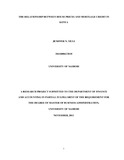| dc.description.abstract | During the last number of years, many countries have experienced sharp rises and drops in housing prices parallel with the world’s economic and financial turmoil. This paper studies the relationship between property prices and mortgage lending in Kenya. Although the close empirical relationship between the evolution of mortgage lending and housing prices is well established in the literature, the direction of causation is less clear from a theoretical standpoint. This is an important topic for three reasons. First, swings in property prices have been extremely large and frequent in Kenya and secondly, under the current currency regime, monetary policy cannot be used to guard against asset price swings. The dramatic increase in lending during this period has been broadly blamed for these market dynamics. However, the empirical relationship between mortgage credit and housing prices remains largely unexplained. The research will employ a quarterly database from 2006 to 2010. A dynamic econometric model will be employed to assess the relationship between housing prices and credit. To investigate this relationship the study will formulate a multiple regression equation and in doing so the research seeks to answer one key question: Has the dramatic increase in mortgage credit caused the booms in the housing sector in Kenya or is it the housing prices that have affected the mortgage market. This approach provides an opportunity to study the major determinants of mortgage debt and house prices in the Kenyan market. Using regression analysis models, the study finds that housing prices affect mortgage credit rather than conversely. The study concludes that the changes in housing prices are positively and significantly related to the long-term evolution of mortgage credit. This result suggests that the evolution of housing prices is not triggered by bank mortgage lending and that banks just accommodate mortgage financing to the evolution of house prices. From the findings and conclusion the study recommends that in order to maintain the prices of housing at relatively stable levels there is a need for the players in the industry to control various factors that affect housing prices which include disposable income, real interest rate after tax, real household debt, housing turnover and housing stock. | en_US |

